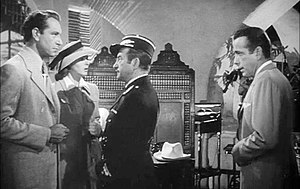 A post to mark 70 years since the start of World War II.
A post to mark 70 years since the start of World War II.I think it's very easy for those generations who didn't live during the war years to forget that the narrative structure surrounding World War II is something which has grown up since it ended, borne of the morale-raising propaganda used to keep Britain's spirits up and guard against "defeatism" during the conflict itself. We younger folk look back on the war as a story: the ultimate battle between good and evil, a plot for films and books and the substance of grandparents' nostalgia-peppered anecdotes. My own grandad, who was 6 when the war started and 12 by the time it ended, talks about the Mickey Mouse sweets he used to get with his ration voucher; teasing his friend Jimmy for being named-checked in Vera Lynn's "White Cliffs of Dover" ("When are you going to sleep in your own little bed, Jimmy?"); scrounging sticks of chewing gum from American soldiers (he'd never seen chewing gum in sticks rather than pellets before); reading comics; helping with paper drives; going to see John Wayne at the pictures. When I was a child, hearing these stories, listening to 1940s music and watching films from that time, the war seemed like a great time to be alive. Yes, I knew there was hardship too: I knew there was rationing, there were bombs, there was the terrible ordeal of evacuation which separated parents and children, there was the constant fear of hearing that a loved one had been killed. Among my grandad's glossy nostalgic anecdotes was a frightening near-miss story of a ship full of evacuees to America which he and his sister were due to take being sunk by a U-boat, killing all on board. The horrors of the concentration camps were the stuff of nightmares for my later years. Even so, I formed a lasting attachment to the era. I'm sure many people my age feel the same, and think affectionately and patriotically of a period when Churchill displayed the Victory sign, George Formby strummed on a ukelele and Douglas Bader overcame disability to become a national hero.
But what I feel people don't often consider, is that when we look back, it's with the certainty of knowing who would win. It almost seems like victory was written, it is so much a part of our national psyche. Nazi victories are the stuff of distopian novels and films created for our entertainment, or a quickly-dismissed comment from an older person that we "might all be speaking German now". It doesn't seem real, or as if it was ever even a possibility. But the war didn't really have a narrative structure. In reality, it wasn't a story but a historic event, which real people lived through. It's hard to imagine now the uncertainty, the fear, which must have been sickening for those people - fears which could hardly be expressed, as "defeatist talk" was not tolerated. In the early years in particular, as Britain appeared to be losing the war, it must have been terrifying for those on the home front to imagine the consequences of a Nazi victory.
"Welcome back to the fight. This time I know our side will win," Victor Laszlo says to Rick in Casablanca. But Victor didn't know that. Nor did anyone involved in the making of that film, which started production in 1942. And I think that's a pretty massive thing to contemplate.
Funny thing, nostalgia. My grandad lived in abject poverty and presumably fear for his life during the war years, but still talks about them as if they were the best time ever. I wonder will I describe the 80s to my grandkids in similar terms?
ReplyDeleteI don't know about Mickey Mouse sweets, but my Dad, born in 1940, remembered his Mickey Mouse gas mask. I read that now we have Mickey Mouse webcams. Seems ol' Mickey is a Trojan horse in many different contexts!
ReplyDeleteI grew up listening to the stories of a woman who had driven ambulances in London during the war. There was no doubt that it had been the most exciting time in her life. If the war had not happened she would have led a stifling provincial life, under the thumb of a decidedly Victorian father. She loved b/w films and autobiographies as they brought it all back. She must have seen some terrible things but it was also a liberating time. My father blames his teeth on WW2 (but at least he still has them).
ReplyDelete